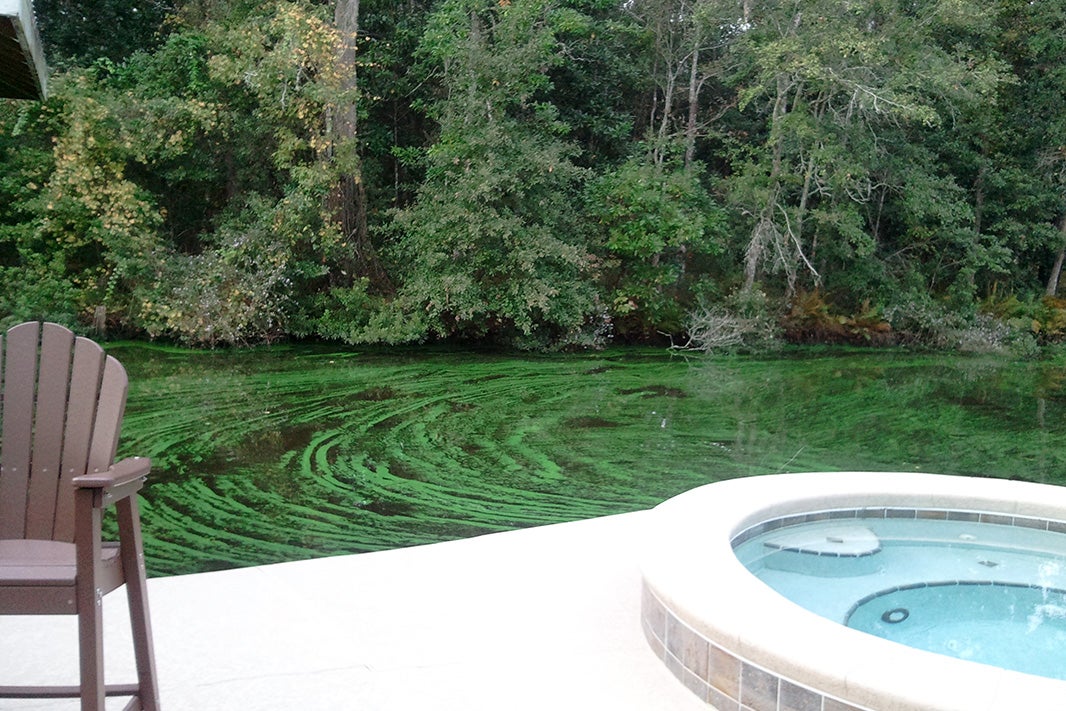In Florida, Toxic Algae is a Year-Round Fight
For those of us living here in sunny Florida, noxious green slime outbreaks like the one that shut Toledo, Ohio's, water system, are now a year-round occurrence.

This page was published 11 years ago. Find the latest on Earthjustice’s work.
A toxic algae outbreak that recently caused officials in Toledo, Ohio to ban citizens from drinking tainted city water for several days, grabbed headlines around the world. For those of us living here in sunny Florida, these noxious green slime outbreaks are now a year-round occurrence.
A water plant that is supposed to serve 30,000 people along Southwest Florida’s Caloosahatchee River, near Fort Myers, has been repeatedly shut down over the years because toxic algae makes the water unsafe.
The main thing to realize is that these outbreaks are preventable. At Earthjustice, we have been in court for 15 years, fighting to get enforceable, numeric limits on the main culprits in these outbreaks—sewage, manure and fertilizer. We have taken our case to the state capital in Tallahassee and all the way to Washington, D.C.
We are fighting for common-sense control of these pollutants. That means using fertilizer in a targeted way on plant roots, and not broadcast spraying it over the land, where most of it is wasted when it runs off into waterways. Several South Florida communities have passed laws that prevent people from fertilizing their lawns during the rainy season, because what they end up fertilizing instead are our public rivers and lakes. These local laws are a great step forward in solving a pollution problem.
But agricultural pollution is the biggest culprit. Despite proven ways to reduce this pollution, agricultural corporations have bitterly fought even the most modest proposed restrictions on their behavior. A few years ago, we watched as lobbyists for agricultural corporations, and their political friends in Congress, actually held the entire budget of the U.S. Environmental Protection Agency hostage until they got lawmakers to remove language that would have enforced stronger limits on this pollution in Florida.
A big polluter like an industrial plant would be fined if it spilled toxic materials into a river. But that's not true for Florida agricultural operations. Florida allows them to use voluntary goals called "best management practices." All the corporation has to do is say it is implementing a plan to control pollution, and it is exempt from monitoring. It's as if you were allowed to speed on the freeway so long as you gave the highway patrol a speed-limit compliance plan.
How many times are we going to have to watch green slime wreck our drinking water, our swimming holes and our beaches? We need to demand that American leaders hold polluters accountable. Every day, factory farms send fertilizer and manure into our public waters, when they could be controlling this pollution on-site.
Everyone should be required to meet specific pollution limits, and they should face consequences if they exceed those limits and trash our water. That’s what the Clean Water Act intended. It’s the fair thing to do for those of us who depend on clean water. And that’s every one of us.
The Florida regional office wields the power of the law to protect our waterways and biodiversity, promote a just and reliable transition to clean energy, and defend communities disproportionately burdened by pollution.